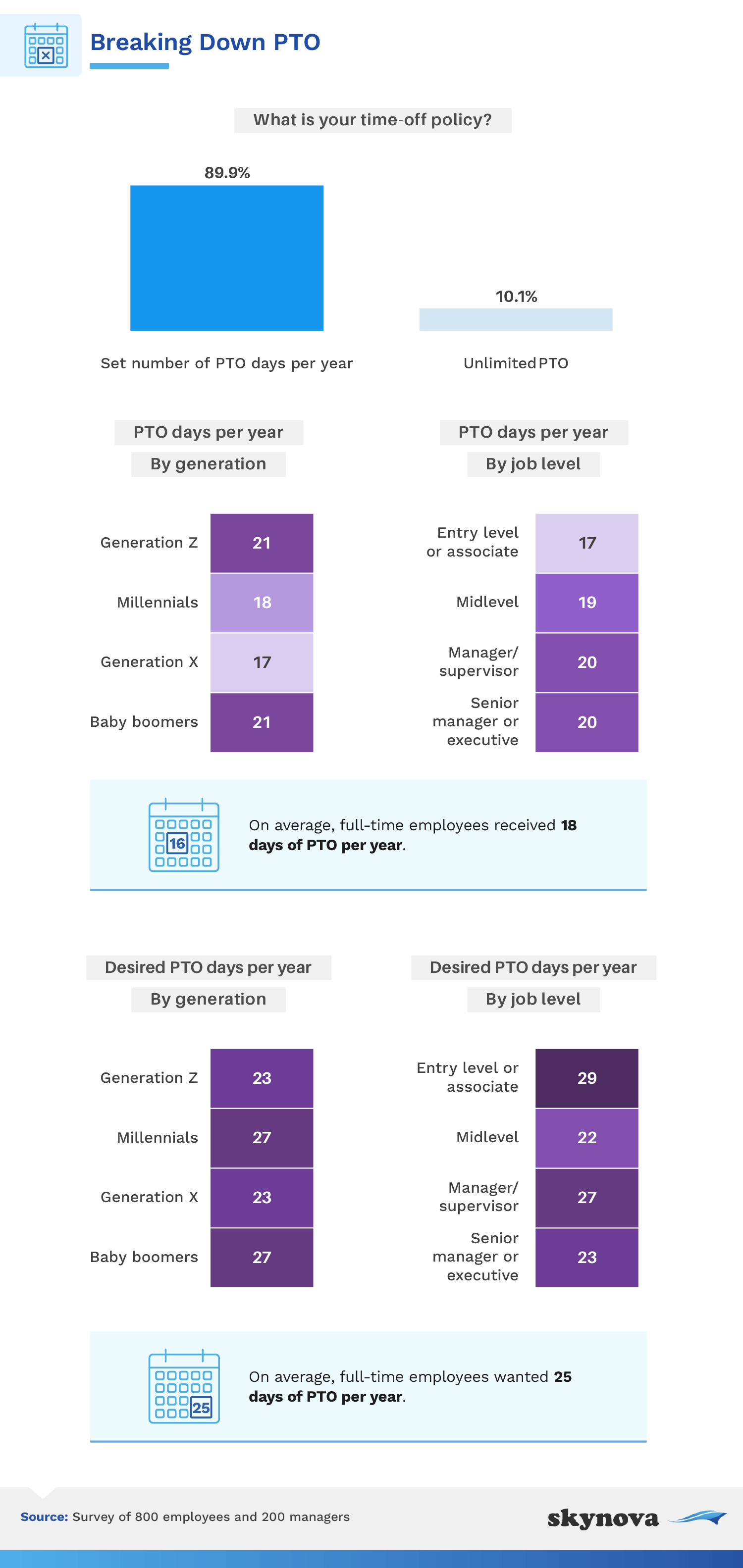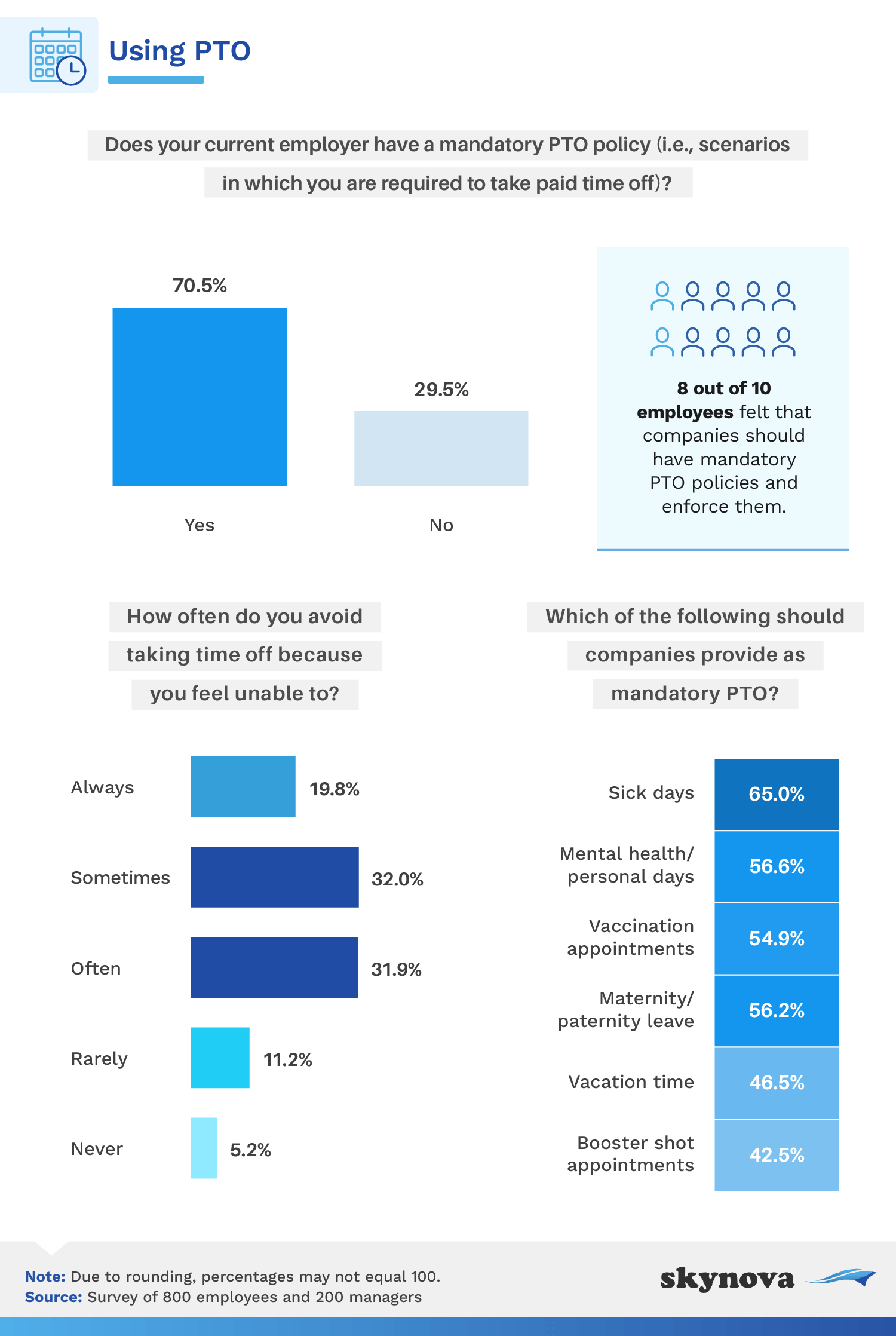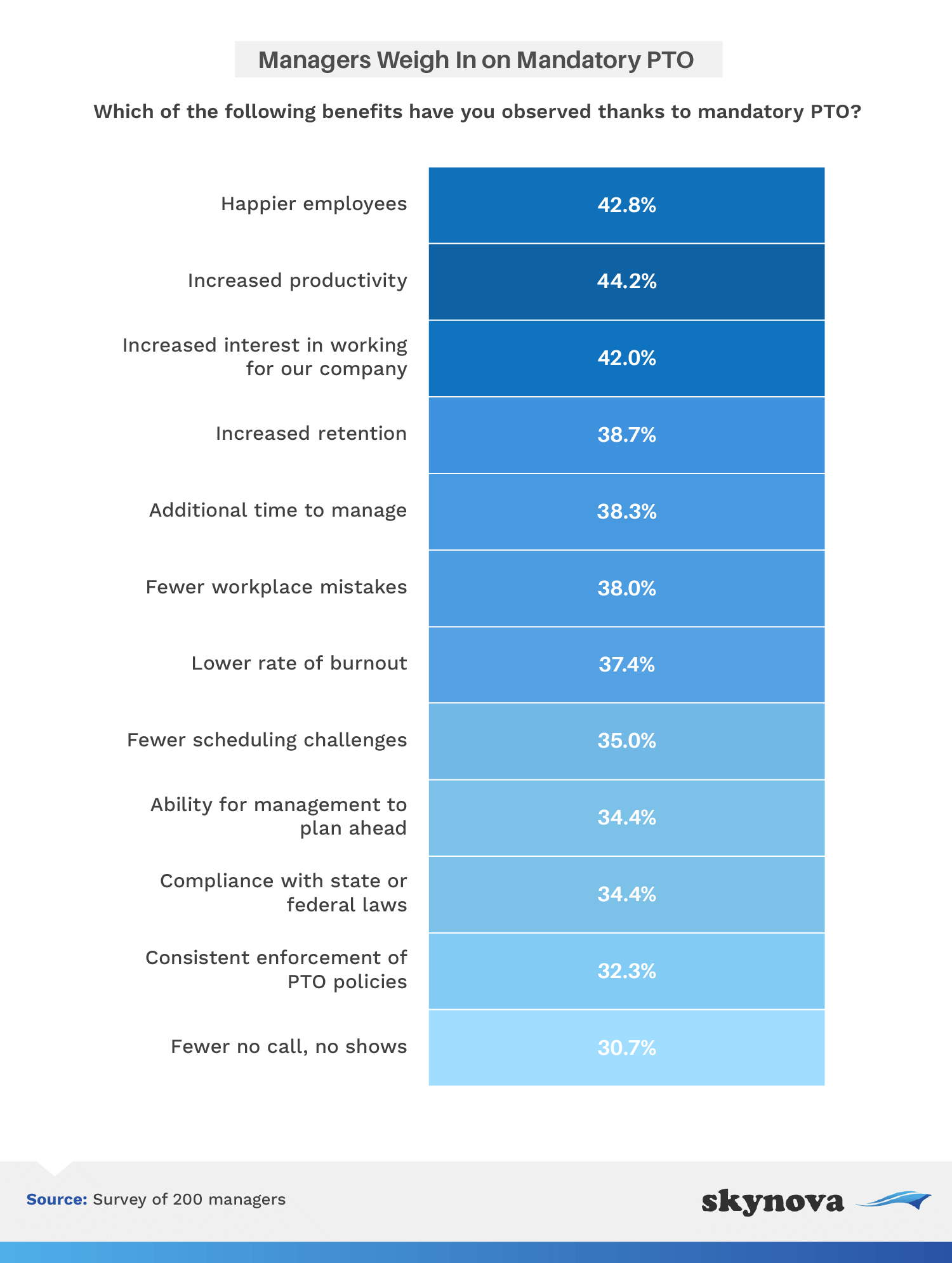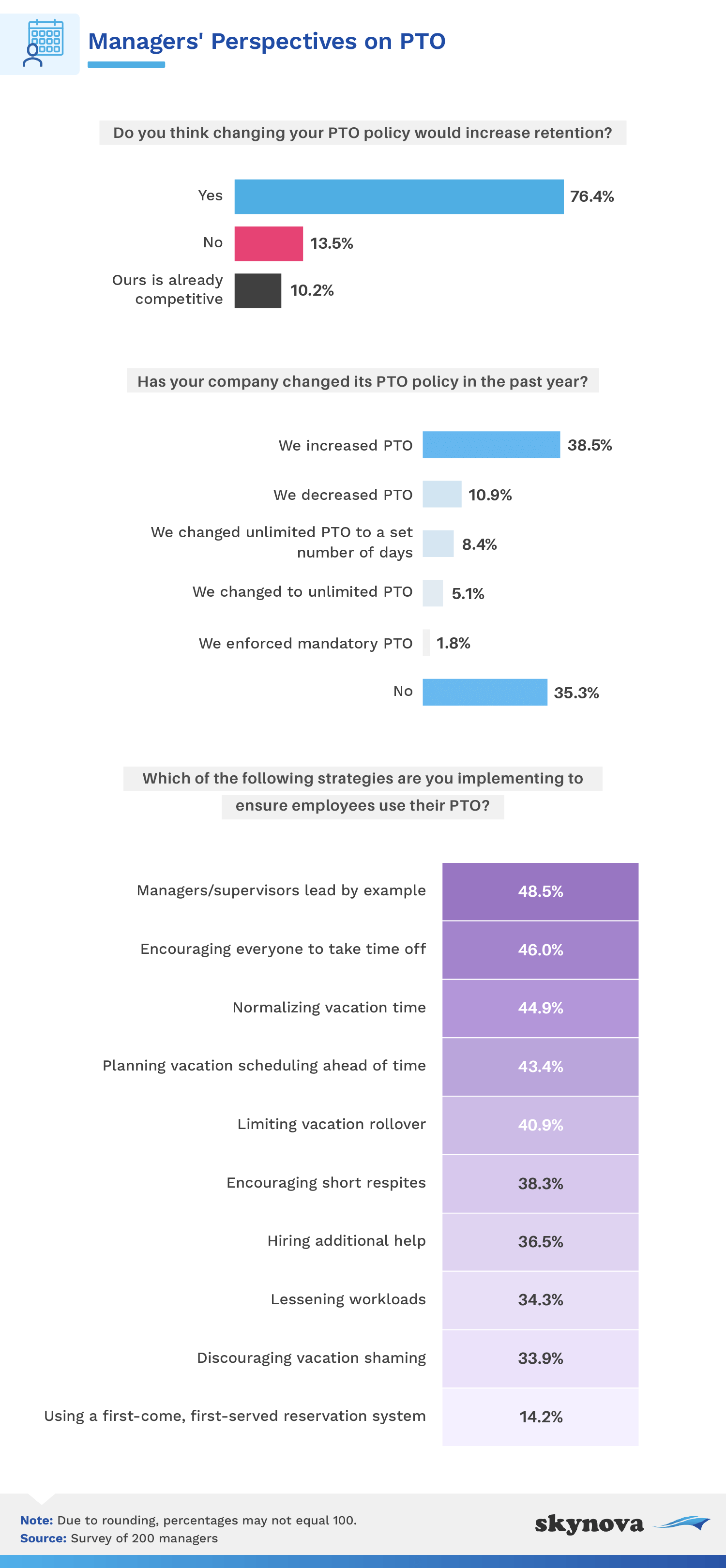
|
The U.S. is currently the most overworked developed nation in the world. While 134 countries have laws limiting the possible number of working hours each week, America does not, and fewer than one-third of Americans plan on using their existing vacation days to the fullest. But with levels of stress and burnout at an all-time high and a recent bill proposed in Congress for a four-day workweek, are things finally beginning to change?
We recently spoke to a group of people who could speak from a place of experience: working Americans. Within this group, 800 people were employees, and 200 were in managerial positions. We asked about their paid time off (PTO) policies, their plans for using them, and how they feel their policies should change. We even looked at the impact of specific PTO policies on Americans’ overall wellness. To see how working Americans feel PTO needs to be adapted, keep reading.
To kick off our study, we first looked into the PTO policies that currently govern working Americans. Respondents shared their general time-off policies, as well as the exact number of days they have for vacation (those with unlimited vacation were not asked to reveal an exact number of days). Then we compared the number of vacation days people actually had to the number of days they wished they had.

The vast majority of Americans have a set number of vacation days. The other 10% have a completely unlimited vacation day policy. While full-time employees averaged 18 days off per year, this wasn’t nearly enough in their opinion. Instead, they wanted this number to increase by 56.25%, on average, totaling a desired 25 days of vacation annually.
The gap between desired vacation days and actual vacation days was fairly large across all generations, but it was most pronounced among millennials. This generation was only receiving 18 days off per year, while they were hoping for 27 days off. Some studies have revealed that millennials may have a literal addiction to work, and since the pandemic, they have been impacted financially more than others. When looking at job levels, entry-level employees received the fewest days off, while they desired the largest number amongst different job levels. With the least amount of leverage and the most to prove, perhaps junior workers feel unable to take vacation days, especially in such a competitive economy.
Having PTO as a policy and actually using it are two entirely different things. We asked respondents if it was mandatory for them to use up their allotted vacation days, if they felt that it should be, and how often they were actually taking full advantage of these policies.

While 70.5% of employees said that their company had mandatory PTO, an even larger percentage agreed that companies needed to actually enforce these policies. It appeared that relatively few companies were actually enforcing the use of PTO, even if the policy was technically mandatory. Moreover, the vast majority of employees (nearly 95%) said that there were times when they specifically avoided taking time off work because they had too much work or lacked the necessary support from their team.
Mandatory PTO proved highly impactful when enforced. More than two-thirds of employees with a mandatory PTO policy rated their at-work happiness as good or excellent, compared to 54.5% of those without a mandatory PTO policy. Employees with mandatory vacation days were also 10 percentage points more likely to experience good or excellent mental health, compared to those without. It’s worth noting that previous research has shown time and again that happy employees are more productive employees, which directly impacts a company’s bottom line.

We wanted to give managers a chance to share how they thought mandatory PTO policies are affecting their companies. First and foremost, they anticipated an uptick in employee happiness (47.8%) and productivity (44.2%). Another 42% also expected people to become more interested in working for the company overall. Other perceived benefits included increased retention (38.7%) and increased time to manage (38.3%).
Sure, more paid time off would likely be a dream come true for employees, but we also wanted to give managers some time to share their opinions. Our study concludes with a look at opinions surrounding PTO, filtering only by those who actively managed employees.

The vast majority of managers (76.4%) agreed that changing their company’s PTO policy would help retain more employees. This means that regardless of their existing policies (mandatory or otherwise), a change of some kind would be helpful in getting employees to stay on board during the current Great Resignation. Only 1 in 10 felt that their existing policies were sufficiently competitive.
Apart from actually increasing PTO (which 38.5% of managers had already done over the past year), managers were employing a host of other strategies to get their employees to take advantage of their time off. For instance, 48.5% said they attempted to lead by example, presumably using their own vacation days. Forty-six percent were actively encouraging their employees to take time off, and 44.9% took steps to help normalize such behavior in their workplace. More than one-third even started hiring additional help to ease workloads. Roughly one-third of managers also reported discouraging vacation shaming—and as effective as those efforts may be, this still points to the regularity with which managers must witness vacation shaming today.
While taking time off may seem counterintuitive to a company’s productivity, employed Americans are proving that mandatory PTO and better work go hand in hand. Those that work under enforced time off are experiencing better levels of mental health, and managers anticipate that well-rested employees will appreciate their jobs even more. That said, very few employees were actually getting the days off that they desired, and almost everyone avoided taking time off—even when vacation was available to them—due to a lack of support.
While managers shared various efforts to get employees to use their time off, there is a limit to the amount of time and energy they can invest in this endeavor.
One easy way to relieve part of your managerial workload is to streamline invoicing and accounting processes, which is where Skynova can help. Skynova provides businesses large and small with professional invoicing and accounting tools. To see how Skynova can ease some of your business stress, head to our website today.
This study uses data from a survey of 800 employees and 200 managers and executives located in the U.S. Survey respondents were presented with a series of questions, including attention-check and disqualification questions. 54.6% of respondents identified as men, while 45.4% identified as women. Respondents ranged in age from 22 to 71 with an average age of 38. 21.3% of respondents were Gen Zers, 33.1% were millennials, 34.2% identified as Gen Xers, and 11.4% were baby boomers. Participants incorrectly answering any attention-check question had their answers disqualified. This study has a 3% margin of error on a 95% confidence interval.
The conversation around paid time off is commonplace in the U.S. To help push this conversation forward, you are welcome to share this data. Just be sure your purposes are noncommercial and that you link back to this page when doing so.